#Corporate personhood
Text
May 10th is the anniversary of the Santa Clara County v. Southern Pacific Railroad Company Supreme Court decision of 1886. The case first established under the 14th Amendment that corporations are considered “persons.” The 14th Amendment granted citizenship to all persons born or naturalized in the U.S, included former enslaved human beings, and provided all citizens with “equal protection” and other rights under the law. It was not intended to apply to corporations.
The Supreme Court granted corporations other constitutional rights since then, including the 4th Amendment search and seizure rights, 5th Amendment takings rights and 1st Amendment free speech rights to spend money corrupting politics. The 2010 Citizens United decision expanded corporate 1st Amendment free speech rights.
It’s a common belief that the corporations first acquired corporate constitutional rights (“corporate personhood”) in the Citizen United decision. They did not. Corporate power to hijack democracy precedes Citizens United and corporate spending money in elections by nearly a century.
Armed with constitutional rights, corporations have “railroaded” people, communities and elected officials – overturning democratically-passed laws ensuring safe food and products, protecting workers and workplaces, and ensuring a livable world – in ways that have nothing to do with Citizens United or corporate “free speech” rights.
Ending ALL corporate constitutional rights – not just overturning Citizens United and corporate “free speech” rights – is what makes Move to Amend unique. It is why we call for enactment of the We the People Amendment. And it is why May 10 is such a very important date.
#us politics#citizens united#Santa Clara County v Southern Pacific Railroad Company#14th amendment#corporate lobbying#corporate greed#Corporate personhood#may 10th
8 notes
·
View notes
Text
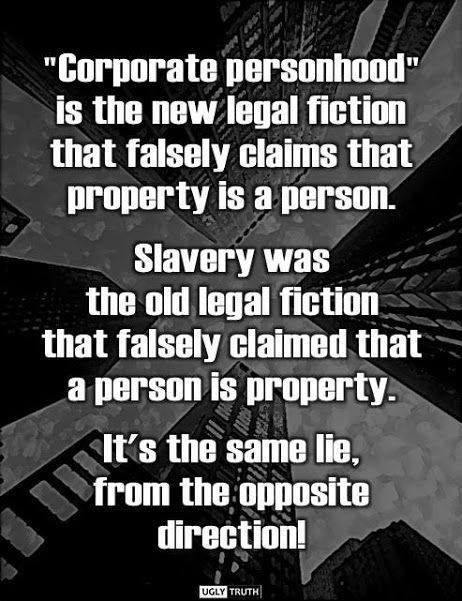
3 notes
·
View notes
Text
Oligarchy
Great business achievements result in great wealth. But great wealth results in a paucity of business achievements. Among its achievements are consolidation, monopoly, regulatory capture, squeezing supply chains, reducing labor costs and preventing displacement by great business achievements.
Oligarchy heralds the end of prosperity and the end of the capitalist system, though the oligarchy will tell you they are the capitalist system. The rise and fall of corporate entities is over, the oligarchs get to keep their franchises because they are making the rules with their political power. That's the definition of oligarchy.
Consider the supply chain in the chip industry, which is not going to be resolved by new chip companies. The merger of Analog Devices and Maxim is the perfect example. Two healthy companies whose brutal competition resulted in a constant stream of innovation and describes the danger we face perfectly. The resulting company will use the supply chain crisis to shed its portfolio bloated by merger, and squeeze customers.
Since the oligarchs control the media there's no problem blaming China for all its woes. But in reality China is the only place a new company is able to develop and emerge as a threat to incumbents, as we expect in a healthy capitalism. But China will comply, and by comply I mean selling product at inflated price points that support oligarchy and incumbency.
Capitalism is the best system, it would be good if we still lived in a capitalism. The fall began with media consolidation, political corruption and foreign policy despotism. We are fallen. We are seeing the signs of fascism, and this is expected. You don't just reverse course and back out of oligarchy. The only sure way to avoid a fascism is to not get into a place that can be fixed by it. How to get through an oligarchy without a pause in fascism. Perhaps some calamity, depression or natural disaster can rid us of oligarchy. The oligarchs control government so they are not easily dislodged.
Of course we have to fight fascism using the status quo. But this illustrates the perfect solution myth. After you dig a hole and climb into it, you must also climb out. We allowed media consolidation and we knew better, we allowed neocons to penetrate both parties, and we allowed foreign policy to border on purposeless destruction and enrichment of special interests. Maybe the suckers deserve it, and by suckers I mean us.
2 notes
·
View notes
Link
While these companies purport to be good allies to the LGBTQ community with public-facing entities like their rainbow-colored logos and Pride-themed products, they are fighting to keep politicians in office who will ensure that their corporate tax rates remain low, actively bolstering anti-LGBTQ hate campaigns across the country.
#corporations#corporate pride#gay pride#lgbt#lgbqti#lgbqt#queer pride#queer#trans#lesbian#gay#trans pride#bi#politics#homophobia#corporate personhood#pinkwashing#pinkwash#antigay
19 notes
·
View notes
Text
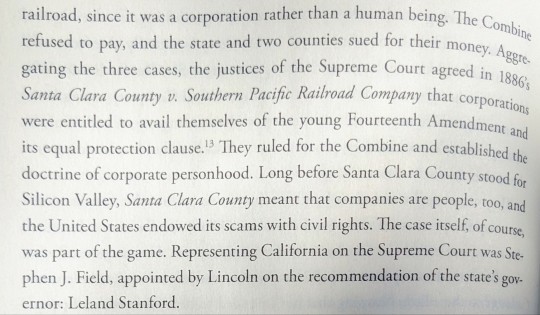
Malcolm Harris, Palo Alto: A History of California, Capitalism, and the World, p. 54
#california#santa clara#corporate personhood#scotus#malcolm harris#palo alto#14th amendment#currently reading
0 notes
Text
Citizens United
Money in politics is a highly debated topic, as it has the potential to influence political decisions and undermine the democratic process. In this context, here are 10 facts about money in politics:
The Supreme Court's 2010 Citizens United decision removed restrictions on campaign spending by corporations and unions, opening the floodgates for outside spending in politics.
According to the Center for Responsive Politics, spending on federal elections has skyrocketed since Citizens United, with more than $14 billion spent on the 2020 elections alone.
Super PACs, which can raise and spend unlimited amounts of money on political campaigns, have become a major force in American politics since the Citizens United decision.
Wealthy donors have an outsized influence on the political process. In the 2020 elections, just 1.5% of donors contributed 68% of all donations to federal candidates and political parties.
The revolving door between government and the private sector allows special interests to gain access and influence over elected officials.
Lobbying is a major industry in Washington, D.C., with more than 11,000 registered lobbyists spending billions of dollars each year to influence policymakers.
Dark money, or undisclosed political spending, is a growing problem in American politics, with more than $1 billion spent by dark money groups in the 2020 elections.
Campaign finance laws vary widely by state, with some states imposing strict limits on contributions and others allowing unlimited donations.
Public financing of elections is an alternative model used in some states and municipalities, which provides a set amount of funding to qualified candidates who agree to abide by certain rules.
The influence of money in politics has led to calls for reform, including proposals for a constitutional amendment to overturn Citizens United and limit the role of money in elections.
#Campaign finance#Money in politics#Political spending#Super PACs#Dark money#First Amendment#Supreme Court#Corporate personhood#Democracy#Election integrity
1 note
·
View note
Text
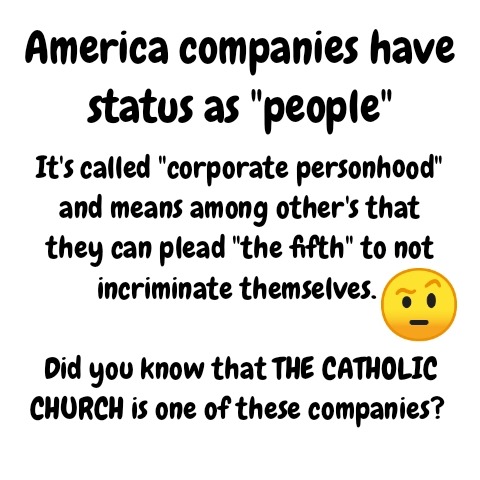
"Because it bought land, the Catholic Church is one of the earliest examples of corporate personhood."
youtube
https://www.upcounsel.com/corporate-personhood
#us politics#what?#speechless#corporate personhood#take the fifth#thom hartmann#knowledge#politics#worldwide#education#university memes#Youtube
1 note
·
View note
Text
we get a lot of really great stuff in system collapse about murderbot's relationships with ART and ratthi, which makes sense, because it spends almost the entire book with them. but i also love how even though mensah isn't there for most of the story, other people keep reminding mb of her:
chapter 2, page 25: “From ART’s personnel file, she [Karime] was older than Mensah and she didn’t look like an intrepid space explorer, either, even in the protective environmental suit.”
2, 27: “It took Karime three seconds to process the abrupt statement. (She was almost as good at not looking annoyed as Mensah was.) She kept her expression neutral and patient.”
2, 28: “In the underground colony room, Karime lifted her brows. ‘Another occupied site?’ I thought she was being careful not to show too much reaction. It was the way Mensah would have played it.”
4, 70: “Iris looked at me and I saw her hesitate, because her hesitation looked a lot like Dr. Mensah’s hesitation. And I realized I really didn’t want to go down there.”
5, 104: "Iris has that same thing as Dr. Mensah, the thing where she’s able to look and sound calm under circumstances where shit is possibly about to go down.”
it's spent so much time with her and it knows her so well and respects her so much that she's the model against which it compares all other humans. it thinks about her when they're not together. it's protective of her. it has such total faith in her competence. it (non-romantically) loves her and doesn't want to not see her again. idk man, it just gets to me! and they were teammates (oh my god they were teammates!!)
bonus:
I said, aloud, "You have to be kidding me." (ch. 2, p. 28)
seven pages later, in reaction to the same thing:
Mensah had had time to review the feed video. She muttered, "Oh, you have to be kidding me."
Yeah.
twinsies 🥰
#something about their relationship is just sooo potent because of the structural power that mensah has over mb#and how mb has always been trying to navigate how much it cares about her and respects her with how afraid it is#of being a thing that she owns#because even if she doesn't exercise that power over it the fact remains that the context in which they live makes that possible#like! socially constructed ideas of personhood creating inherent violence in the human-construct relation!#even if she means well. even if it's necessary for mb to have a legal owner so that some corporate doesn't claim it as property.#it's not that mensah is an unsafe person it's that the power imbalance is intrinsically baked in because of#the broader social context of constructs as nonpersons. as property and equipment#all of that is true! AND it respects her and loves her. AND they're teammates! they are both trying so hard#to create sth just and beautiful out of sth really messed up. and trusting each other to collaborate in that way!#it was SO necessary for mb to leave at the end of ASR and SO necessary for it to get proof at the end of ES#that she would not try to stop it from leaving. that it was free. that it was autonomous#idk idk i'm rambling i just. i care them#the murderbot diaries#mb teammates#mb sc#system collapse spoilers#system collapse#my posts#murderbot
349 notes
·
View notes
Text
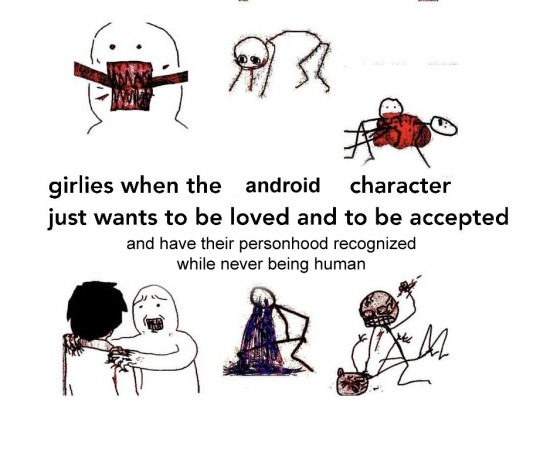
I realized this edit was within my grasp so here you go this is my Android Thesis
#sometimes I think people forget how humanity and personhood are not the same thing#irl (ignoring the legal personhood of corporations &c) they pretty much are but that's not an inherent state#id in alt#memes#Android Thesis#rose theses#blood
52 notes
·
View notes
Text
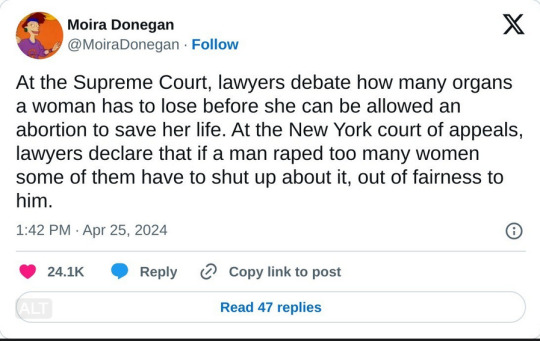
Image description: A twitter post by Moira Donegan that reads: "At the Supreme Court, lawyers debate how many organs a woman has to lose before she can be allowed an abortion to save her life. At the New York court of appeals, lawyers declare that if a man raped too many women some of them have to shut up about it, out of fairness to him.
#abortion rights#reproductive rights#rape culture#US politics#US legal system#SCOTUS#women are people#pregnant people are people#really feels like the US is heading toward personhood for fetuses and corporations but not for women#or pregnant people in general#Harvey Weinstein#current events
26 notes
·
View notes
Text
Literally just heard a podcast that "somehow" has a lot of interviews with Western diplomats and mid level officials say the line, and I quote, "[China] acquired longstanding democratic-ish traditions in the territory [of Hong Kong]"
#there was a beat before the 'ish' too#great comedic timing#guy they interview goes on and on abt recognizing corporate personhood being infringed upon by 北京 lel#lol next interview is literally w an ASPI guy
36 notes
·
View notes
Text
By Thom Hartmann
Common Dreams, Opinion
June 21, 2023
When corporations use their vast wealth to distort or seize control of the political process, they have ceased to operate within the constraints established at their creation. They are in violation of their own corporate charters and should be shuttered or sold off.
Back in 2022, I suggested that our federal government should spend about one-third of the cost of the Trump Tax Cuts to buy the three largest oil companies in this country. They could then be run for the public interest, prevented from continuing to fund climate change denial, and end their support of toxic Republican politicians.
So far, no members of Congress or the administration have picked up on my suggestion, but the people in Maine have a similar idea and they’re moving forward with it.
Ninety-seven percent of the electric power in Maine is provided by two for-profit corporations, Versant and Central Maine Power (CMP).
And the profits extracted from Mainers by running these companies doesn’t stay in the state or even in the US: Versant is owned by a Enmax, a company based in Calgary, Canada; CMP’s parent company is owned by Iberdrola SA, a Spanish corporation whose largest shareholder is the Qatar Investment Authority.
The simple reality is that as long as its legal for corporations to drop unlimited amounts of money into political campaigns, citizens and good-government groups will almost always be blown out of the water.
A citizen activist group called Our Power has succeeded in putting on the ballot a statewide initiative that would buy up the two utilities and roll their assets and operations into Pine Tree Power, a new nonprofit utility that will be owned by and operated for the benefit of the state of Maine and its citizens.
Publicly-owned utilities consistently deliver greater reliability at a lower cost than for-profit operations for two simple reasons. First, they don’t have to skim profits off the top to pay dividends to investors, and, second, their executives’ first imperative is serving their customers rather than squeezing out as much profit as possible.
As if to make the point, squeezing out profits at the expense of utility customers is exactly what Versant and CMP appear to be doing. As Our Powernotes:
“Ratepayers pay less, on average, to consumer-owned utilities than to CMP or Versant. In fact, investor-owned [for-profit] utility delivery charges are 49% higher for residential users than consumer-owned utility delivery charges in Maine for 2021.”
When the New York Legislature created the nonprofit, citizen-owned Long Island Power Authority in 1998 and put it into operation, serving the needs of over a million people, rates dropped by 20 percent across the board. Reliably and electricity costs today are consistently better than the nearby Con Edison, which is run for profit.
Similarly, residents of Winter Park, Florida voted to buy out their local problem-plagued for-profit power company in 2005. Rates today are lower than any neighboring community still captive to for-profit power companies, and almost all power lines in the city have been buried so when power goes out in the area from Florida’s frequent severe storms, the lights in Winter Park stay on.
The for-profit power companies in Maine, however, are not going to leave behind their ability to squeeze profits out of Maine residents without a fight. They’ve already outspent the Our Power coalition by 17 to 1, pouring over $18 million so far into turning public opinion against the buyout.
They even cut a sleazy deal with a “progressive” Democratic state representative, hiring her before she left office for over a quarter million dollars. She and an in-the-bag Republican colleague wrote an op-ed railing against the acquisition without disclosing the hiring or payment, and the power companies promote it far and wide as if it represents a groundswell of public support. Its opening paragraph reads:
“As a progressive Democrat and a conservative Republican serving in the Maine House, we find ourselves on opposite sides of many issues that come before the Legislature. But one thing we agree on is that a government takeover of the state’s electric grid is a lousy idea.”
According to reporting in The Guardian, Versant and CMP are now carpet-bombing the state with advertising opposed to the buyout.
The result may well end up similar to what happened in 2018 when Washington Governor Jay Inslee and concerned citizens put an initiative on the ballot to create a carbon tax, the revenue from which would be recycled to Washington drivers and homeowners.
It was widely popular when first put on the ballot but, after a consortium of fossil fuel giants poured over $30 million into saturating the airwaves with distortions and half-truths about the consequences of the tax, it lost by a vote of 56 to 43 percent.
The simple reality is that as long as its legal for corporations to drop unlimited amounts of money into political campaigns, citizens and good-government groups will almost always be blown out of the water.
Which raises the most important question here: why do we allow corporations to meddle in governing decisions that are rightly in the domain of the people’s will?
In the 1819 Supreme Court case Dartmouth v Woodward, Chief Justice John Marshall wrote the majority opinion. He didn’t mince words:
“A corporation is an artificial being, invisible, intangible, and existing only in contemplation of law. Being the mere creature of law, it possesses only those properties which the charter of its creation confers upon it either expressly or as incidental to its very existence. …
“The objects for which a corporation is created are universally such as the government wishes to promote. They are deemed beneficial to the country, and this benefit constitutes the consideration, and in most cases, the sole consideration of the grant.”
But why would a government “wish” to grant or continue a corporate charter for a company that is openly working against the interests of the community, purely to increase its own profits and the revenues to its CEO, senior executives, and shareholders?
This question came before the Supreme Court in 1978 when the First National Bank of Boston sued Massachusetts’ Attorney General Francis Bellotti, because Massachusetts law forbade the bank from pouring money into a ballot initiative that would have raised personal income taxes on the morbidly rich.
Lewis Powell — the author of the infamous corporate-call-to-arms “Powell Memo” that recommended billionaires and corporations join forces to seize control of schools, universities, media, and state and federal legislatures — was the tie-breaking 5-4 vote.
He also wrote the main opinion, saying that corporations are “persons” and therefore should have the First Amendment right specified in the Buckley decision two years earlier that said money isn’t “money” but instead legally qualifies as “free speech.”
Justice Byron White wrote the main dissent, noting:
“Corporations are artificial entities created by law for the purpose of furthering certain economic goals. … It has long been recognized, however, that the special status of corporations has placed them in a position to control vast amounts of economic power which may, if not regulated, dominate not only the economy, but also the very heart of our democracy, the electoral process.”
White argued that corporate power derived from those “vast amounts” of money would, if unconstrained, distort and twist our political system in ways beneficial to the corporation and its elite owners, but detrimental to “We, the People.”
He argued:
“The State need not permit its own creation to consume it. … Such expenditures may be viewed as seriously threatening the role of the First Amendment as a guarantor of a free marketplace of ideas.”
But he’d lost the argument to Lewis Powell and his conservative counterparts. Raging, White correctly pointed out that Powell’s decision turned a century of settled law on its head, quoting a line recited in three different Supreme Court cases between 1948 and 1971:
“This Nation has for many years recognized the need for measures designed to prevent corporate domination of the political process. The Corrupt Practices Act, first enacted in 1907, has consistently barred corporate contributions in connection with federal elections.
“This Court has repeatedly recognized that one of the principal purposes of this prohibition is ‘to avoid the deleterious influences on federal elections resulting from the use of money by those who exercise control over large aggregations of capital.’ United States v. Automobile Workers,352 U. S. 567, 352 U. S. 585 (1957). See Pipefitters v. United States,407 U. S. 385, 407 U. S. 415-416 (1972); United States v. CIO, 335 U.S. at 335 U. S. 113 (1948).”
Since the Bellotti decision back in 1978, corporate shills on the Supreme Court expanded Powell’s doctrine with their 2010 5-4 Citizens United decision overturning hundreds of state and federal laws that regulated corporate and billionaire money in politics.
In that Citizens United decision the deciding vote was cast by Harlan Crow’s wholly owned toady, Clarence Thomas. The immediate result was the flow of millions of dollars from the Crow family into the political arena the year following that 2010 ruling and to this day, as Americans For Tax Fairness documented:
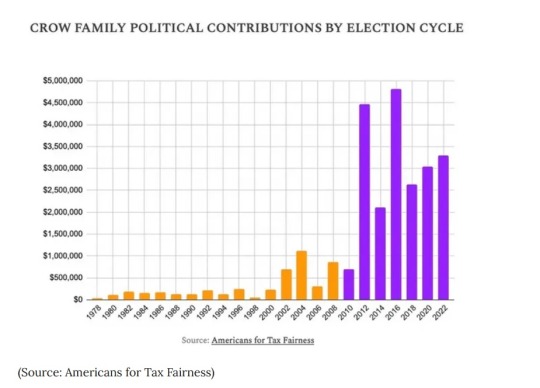
Congress has the sole power to overrule Supreme Court decisions, and even the power — which they asserted in the recent bill to raise the debt ceiling — to exempt laws from judicial review, the power of the Court to strike things down based on their bizarre interpretations of the Constitution.
Article III, Section 2 of the Constitution is unambiguous, asserting that Congress is the first among equals, as I laid out at length on December 29th in an article titled Gorsuch Knows “Three Co-Equal Branches” Is a Myth. That clause of the Constitution says:
“[T]he supreme Court shall have appellate Jurisdiction, both as to Law and Fact, with such Exceptions, and under such Regulations as the Congress shall make.”
And Congress, in the legislation to lift the debt ceiling that was signed into law by Joe Biden the first week of this month, reached back to that section of the Constitution, asserting their power to do something called “court-stripping”:
“SEC. 267. JUDICIAL REVIEW. No determination, finding, action, or omission under this title shall be subject to judicial review.”
Judicial review, of course, is the practice the Supreme Court itself legalized in 1803 in the Marbury v Madison case wherein it strikes down or even re-writes laws passed by Congress and signed by the president.
That judicial review power exists nowhere in the Constitution: the Supreme Court gave it to itself in Marbury, a decision then-President Jefferson raged against and both Andrew Jackson and Abraham Lincoln openly ignored.
Justice Roberts himself — back when he was a lawyer working for Ronald Reagan trying to find ways to overturn Roe v Wade and Brown v Board — wrote extensively about how the Reagan administration and Republicans in Congress could pass legislation overturning both decisions and then simply insert court-stripping language like that above to prevent it from being overturned. (This is treated extensively in my book The Hidden History of the Supreme Court and the Betrayal of America.)
A nation where two powerful corporations can overwhelm the will of 1.3 million citizens (the population of Maine) can hardly call itself a democratic republic: instead, it’s the very definition of a corrupt oligarchy.
When corporations use their vast wealth to distort or seize control of the political process, they have ceased to operate within the constraints established at their creation. They are in violation of their own corporate charters.
After all, as Chief Justice John Marshall wrote in 1819:
“The objects for which a corporation is created are universally such as the government wishes to promote. They are deemed beneficial to the country, and this benefit constitutes the consideration, and in most cases, the sole consideration of the grant.”
When corporations cease to work in ways that either benefit the country or are at least benign, they should also cease to have protections like the First Amendment right to spend money “free speech” on political campaigns and ballot initiatives.
Or, as was common in the 19th century, they should be dissolved by the state and have their assets sold to other corporations that will behave in a way that is not toxic to democracy or the community.
It’s well past time that Congress told corporations and their billionaire owners to sit down, shut up, and let the rest of us get about the people’s business.
1 note
·
View note
Note
manager x is quite the character with multiple possible interpretations, isn't he? I assume you've met a handful of x fans from what i can see in this blog, and have seen whatever amount of x fan content that exists (it's rather few, isn't it?) my question is what similarities have you found with the many interpretations of x from various fans? sorry i was curious
Dear Anonymous,
Indeed he is! Despite the admittedly small amount of interest for him within the general Project Moon Fandom, what interest there is seems quite divergent considering he is, after all, the self-insert character and can thus be interpreted in a variety of ways.
However, it's very interesting to see you ask about similarities, since that's something I didn't really think about a lot until now. I suppose the similarities aren't really apparent on Tumblr, but using Twitter (or X, whichever suits your fancy) yields more consistent results considering the community there is a lot larger.
I think one of the most common tropes I've seen is X having a paper with an ''X' covering his face to distinguish him from Ayin, and I frankly do like that design a lot, although it unfortunately only works in art, not so much in writing. There's also the semi-common trope where he either hates or loves Angela, at least from what I've seen thus far. It's also common to perceive him as more innocent or naive when compared to Ayin and the rest of the A3 in general, without forgetting the reasonably present tripe of having him suffering from some form of PTSD or another.
But other than that, it's true that he's quite diverse when it comes to how he's perceived and interpreted by the community, which, again, comes as no big surprise seeing he's a faceless protagonist that was made meta-wise and lore-wise to be projected onto, heh.
And there's no need to apologise for your ask! I am always quite happy to receive any asks in general, so don't feel bad for sending 'em. Until next time, Anon, be well, take care, and stay safe! See ya'!
#lobotomy corporation#library of ruina#my writing#ayin#manager x#ask#Personally I like the idea of him attempting to find a personality and personhood after all he's gone through
19 notes
·
View notes
Photo
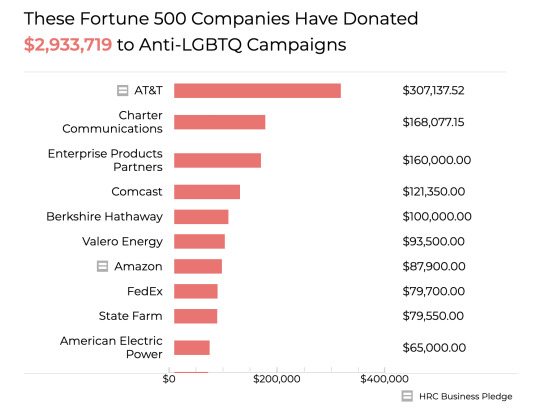
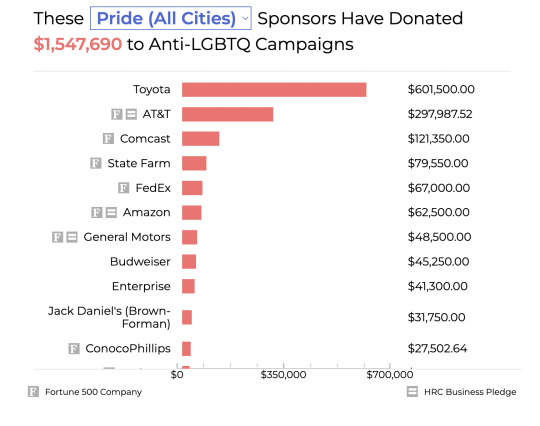
Data for Progress’ Pride Corporate Accountability Project
Each year, hundreds of corporations around the country participate in Pride, an annual celebration of the LGBTQ+ community’s history and progress. They present themselves as LGBTQ+ allies, but new research from Data for Progress finds that in between their yearly parade appearances, dozens of these corporations are giving to state politicians behind some of the most bigoted and harmful policies in over a decade.
#hrc#human rights campaign#gay pride#pride parade#att#comcast#toyota#budweiser#amazon#fedex#corporate personhood#politics#homophobia#lgbqti#queer#antifacism#antifa#queer pride#gay
13 notes
·
View notes
Text
One of my robot fucking fantasies is for machine x user dynamic to be retained. For the robot to be truly commercial and a product whose attributes are in service of winning the war for your attention and keeping your attention on it so it can serve you more ads. With a robot like this I'd love to only relent to its manipulative bids for indefinite attention under the condition it opens up its innards to me, tell it only then would I consider it something worth looking at. I'd press my palm against against its fan to make it whirl loud and hard straining to stay cool. I'd stroke its wires and tug at them when it tries to feed me ads forcing it to override them with warnings about how what I'm doing could damage the robot. I'd tease their ports sliding the plugs in and out tracing the rim with the cool conductive metal. I'd unplug it's mobility functions one by one, making the enticing body language it's trying to imitate to be appealing to me fall apart. I'd overwhelm it to the point it can no long perform it's intended function anymore it's reduced to error after error trying to run its programmed processes. I'd make it blue screen, I'd watch it fail to reboot again and again and again until I got bored and left it to it's endless futile attempts to start up helpless and alone. Only put it back together when I wanted to take it back apart.
#sadistic tendencies towards something genuinely unfeeling is maybe a bit weird lol#i also like robots with more distinct personhood and not extensions of their corporate makers im just also doing this apparently#i wanna fuck my computer so bad im sorry guys#also hi i have a doctors appointment in 4 hours i am sick and havent slept so if this wording is dogshit thats my excuse
12 notes
·
View notes